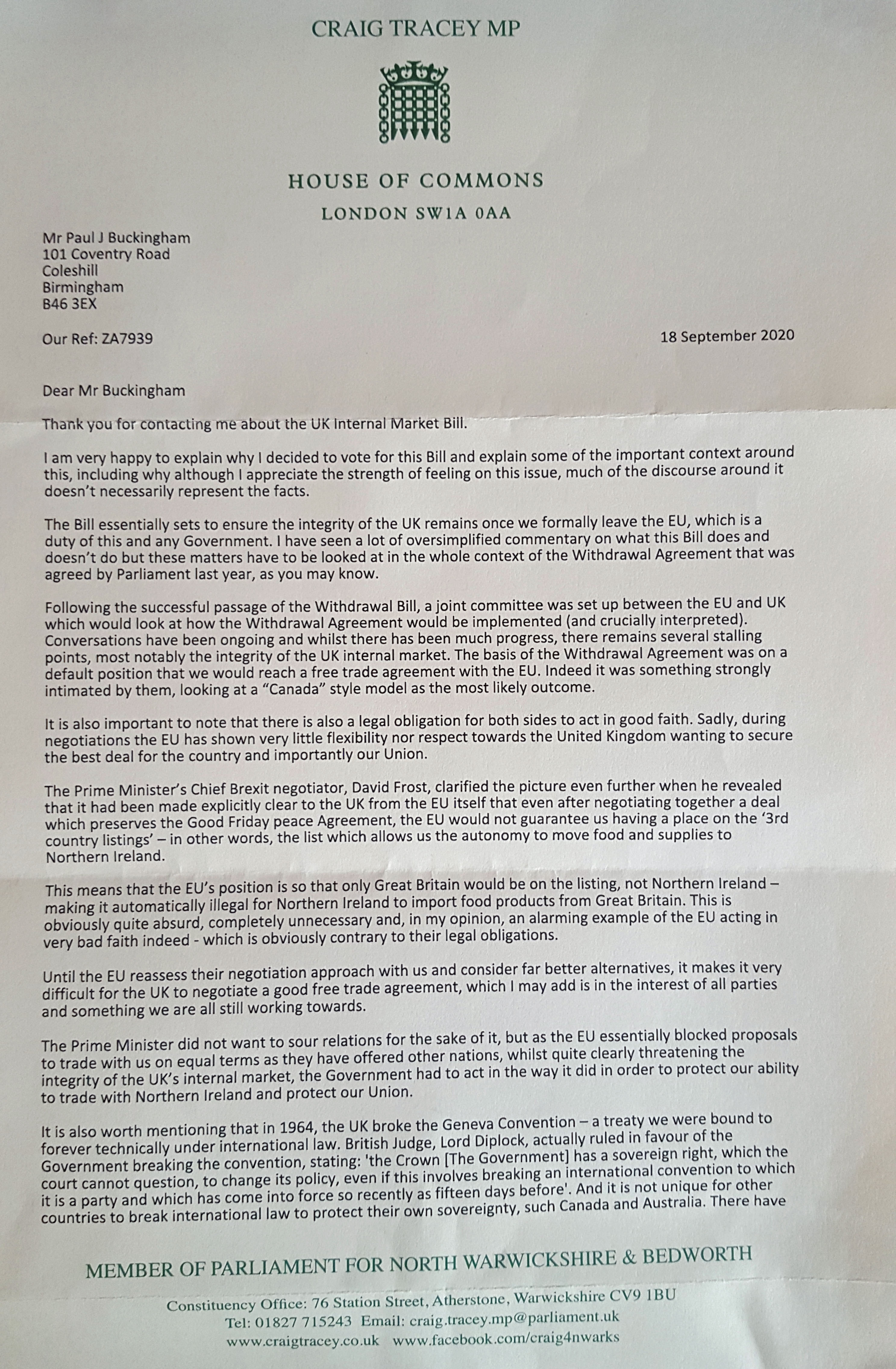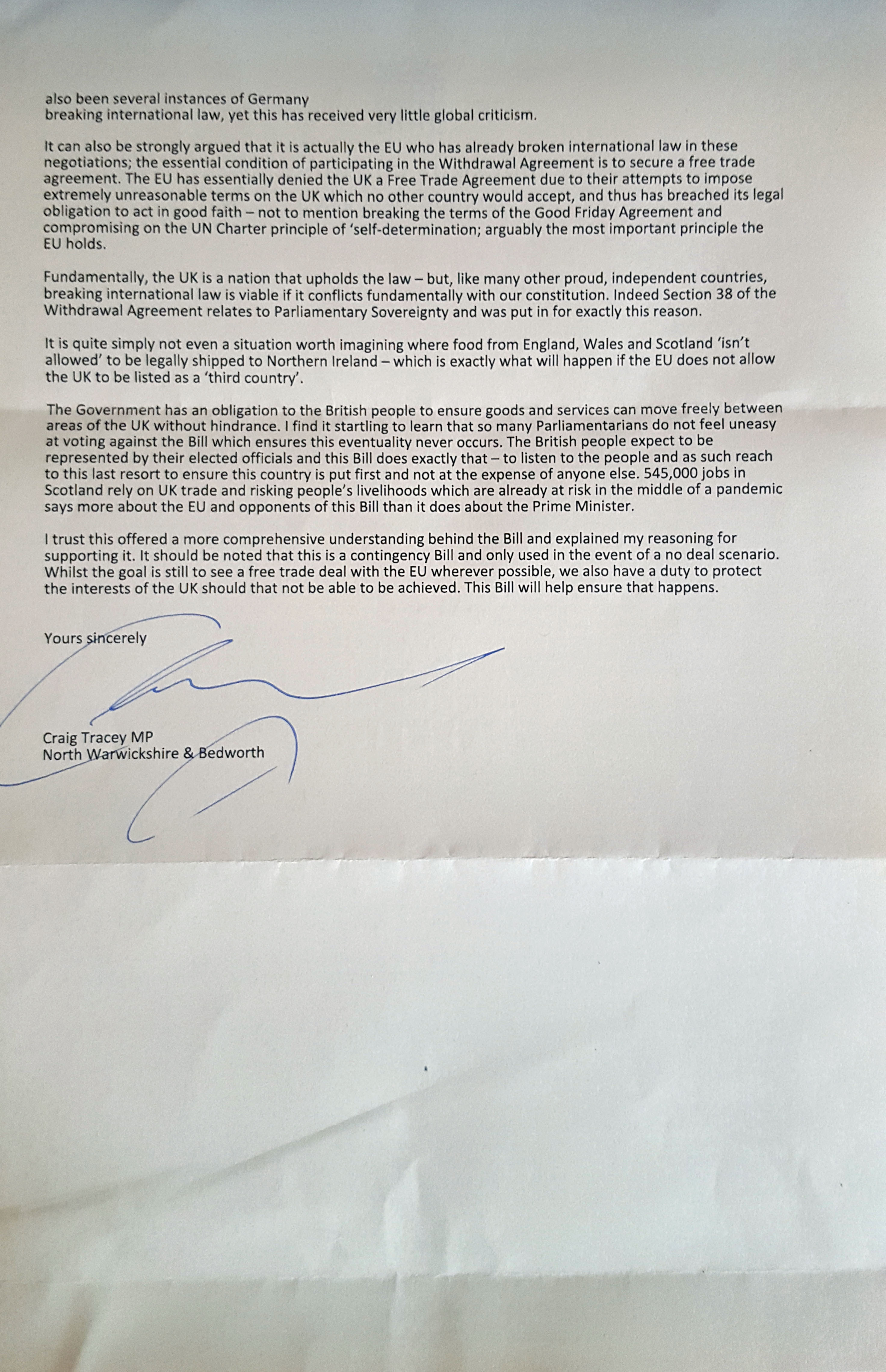| An
exchange of views with my MP regarding the
government's willingness to ignore the Rule of Law |
||
| My
initial e-mail to Craig Tracey MP
8 September 2020 I note that your colleague Brandon Lewis has now admitted that the government’s proposed Brexit legislation will infringe International Law in a "specific and limited way". If a burglar were to say that he had only broken into one house rather than a number of them - so only infringing the Theft Act in a ‘specific and limited way’ - would that justify his conduct? I note that the permanent secretary to the Government Legal Department, Sir Jonathan Jones, has announced his resignation as a consequence of the government’s intention to ignore their legal obligations under international law. There is such a thing as the Rule of Law. It is currently being ignored in many countries around the world to the extreme detriment of the peoples of those countries. I had hoped that the United Kingdom would continue with its tradition of abiding by the Rule of Law in order to preserve our democracy. The Law Officers have all sworn to abide by the Rule of Law. All ministers and members of the civil service have undertaken to do the same. I cannot therefore understand how we can possibly have arrived at this pass. I can tell you that I voted for your party at the last election because I considered that Johnson was a lesser evil than Corbyn. Any government which deliberately flouts the Rule of Law will not have my support in the future. Please confirm that you will vote against any such legislative proposal. Paul Buckingham (sent via the contact page of the MP's web-site) Craig Tracey's letter in reply of 18 September:   My response sent 24 September: Dear Mr Tracey Thank you for your letter of 18th September giving your considered views on our international law obligations and the Internal Markets Bill, views not, it seems, shared by any past Conservative Prime Minister and causing our reputation and influence around the world substantial harm. Your letter conflates a number of different matters. Perhaps I can unpick them for you so that you can have another attempt at justifying the government’s stance: 1. In connection with a case before the Court of Appeal in 1968 involving a pirate radio ship anchored in the Thames estuary, you quote Lord Justice Diplock who said: “...the Crown has a sovereign right, which the Court cannot question, to change its policy, even if this involves breaking an international convention to which it is a party...”. You say that Lord Diplock “ruled in favour of the government breaking the convention”. This is untrue - he only said that the government had the right to do so. Frankly, though, this is 1st year law student stuff. Every lawyer knows that UK domestic law overrides international law, unless of course that international law is incorporated into, and so becomes, domestic law, as European law was when we joined the Common Market. International law, however is still ‘law’ for the purposes of the Rule of Law. And the ministerial code includes an obligation to observe it, as your government has accepted. The 2018 case by the Gulf Centre for Human Rights against the Government was brought because of a rather strange amendment to the introduction to the ministerial code to remove a reference to international law. The Court of Appeal, at the invitation of Counsel for the Government, relied on assurances in the House of Lords by the then Minister of State at the Ministry of Justice (Lord Faulks) to the effect that, despite that amendment, the legal obligations of ministers remained unchanged. The civil service is also obliged to observe international law, hence the resignation of the government’s top lawyer. You fail to address this. 2.1 You then go on to excuse the UK Government’s stance by saying that other countries have breached International Law. And the point you are making is...? You sound like a naughty boy who’s been found smoking behind the bike sheds and saying “but Smith minor was smoking as well sir!”. So what? The point is that we are now the ones deliberately setting ourselves up to breach the Rule of Law. Your government wishes, not in a small way and not by accident or unintentionally, but deliberately, to override a treaty it signed less than a year ago, a treaty signed by Boris with a fanfare announcing how wonderful it was for us. 2.2 In passing, I’m guessing that the reference to Germany as one of the countries breaching international law is to the somewhat complex ‘debate’ between the ECJ and Germany’s Constitutional Court. The German court held that the European Bank, and subsequently the ECJ in approving its actions, had acted ultra vires in coming to the decision it did. This has been pointed to by a number of commentators, particularly in the Spectator and also in that well-known legal journal, the Daily Express, as a being a breach of Germany’s treaty obligations. In fact the German Court says that it is not. It is a judgement that the EU treaty obligations did not, at the most fundamental level, allow the Bank to take the actions it did and that the ECJ was in consequence incapable of validating that decision. To repeat, the German court’s decision was that such actions were ultra vires the European treaties and so there could be no breach by Germany by their not complying with an invalid ruling by the ECJ. It’s rather like when the Supreme Court unanimously concluded that, despite Boris’s best efforts to shut down the democratic process, Parliament had simply not been prorogued. That the European Commission has done nothing to penalise Germany for its ‘breach’ is probably because it tacitly accepts that there wasn’t one. 3. The UK government says it is willing to break international law in a "very specific and limited way". You refer to the possibility of it being illegal to move food and supplies to Northern Ireland. There are two distinct aspects to this – the matter of food and the question of supplies of non-food products. As you may be aware, they are treated differently. 3.1 The non-food products are the items in respect of which it appears that the UK government will ignore its international obligations by deciding unilaterally what should go on the list of items not at significant risk of going from Northern Ireland across the border to the EU. This would thereby avoid having to fill in on-line customs declarations for those particular goods. Filling in declarations, however, does not amount to a ‘blockade’ between mainland UK and Northern Ireland as Boris has told us. It is unwelcome red tape, but no more than that. Even if the risk list were agreed, there would still be many items for which declarations would still have to be made. 3.2. The matter of food, however is different. In this connection, we have the EU sanitary standards to comply with. You say that the EU should simply admit us to its list of third countries as we already comply with them. You point to this as an example of bad faith on their part. You will be aware that our existing standards are necessarily the same as those of the EU, as we are still in the transition period. The Agriculture Bill, which passed its third reading in the Commons in May failed to incorporate an amendment tabled by one of your colleagues, Neil Parish, Conservative MP for Tiverton and Honiton, and supported by the farming community and many others. It sought to protect UK farmers from low-standard food imports. The clause would have prevented future international trade deals from allowing food into the UK not produced to the standards required of farmers and processors within the UK. It would have put into law the guarantee of minimum food safety standards promised by the Dear Leader. This was clearly in a bid to make the UK market pliable for a post-Brexit US trade deal. But it not only removes the concept of a level playing field for our farmers, thus exposing them to major financial risk, but also obviously gives support to the EU’s stance in asking for legislative reassurance regarding the future. Unsurprisingly, the EU is not willing to keep its fingers crossed that nothing will change. The EU says it is not refusing to put the UK on the third country list. Instead, it says, it is simply waiting to find out what the UK's import and export rules will be post 2020, before it makes a decision. The Lords this week in effect amended the Bill to reinstate the amendment rejected by the Commons. So why doesn’t your government just accept this Bill as amended when it comes back to the Commons, so outlawing the dreaded chlorinated chicken and hormone treated beef? If indeed you don’t propose to lower standards in the very many international trade agreements we were promised, then why not commit yourselves to it in legislation? I see that Baroness Noakes, no doubt with her tongue very firmly in her cheek, said: “The Government’s policy is clear. They are committed to higher food and welfare standards. We do not need to write into law what the Government is committed to.” Something of an irony? 4. Then there is the question of the need for the UK to follow EU state aid rules when they affect businesses with a branch in Northern Ireland, whether or not the company’s headquarters are there or in mainland UK. Boris claims that this is unfair. He says that EU jurisdiction should be limited to those businesses where control resides in Northern Ireland. But it was what Boris signed up to and I don’t think that he can claim that he wasn’t aware of what it all meant at the time and so now ignore it. I knew, and I’m just an ordinary constituent. 5. You refer to the obligation on both sides to act in good faith in negotiating the outstanding provisions of the treaty. You say that not to do so on the part of the EU is a breach by them of international law. I’m afraid, however, that ‘good faith’ is in the eye of the beholder. And a requirement to negotiate an agreement in good faith, or to use ones best endeavours to come to an agreement, is not actually an enforceable provision. As my old law lecturer told us – an agreement to agree is never enforceable, however many words you use to dress it up to look like something else. I did wonder if you were the actual author of your reply, rather than someone at Conservative HQ. As a matter of courtesy, I will assume that it was not you because, whilst for political obfuscation I would award it high marks, for an accurate representation of the applicable law, whether domestic or international, I would give it ‘nul points’. Or is that too European? Yours sincerely, Paul Buckingham 24 September 2020 |
||
|
|